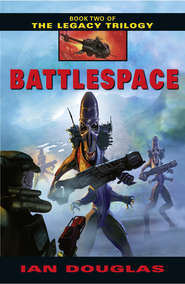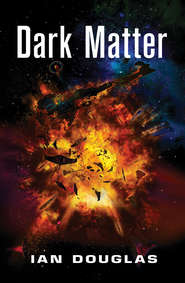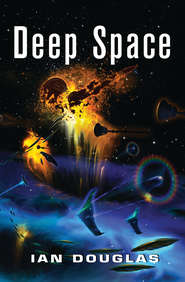По всем вопросам обращайтесь на: info@litportal.ru
(©) 2003-2025.
✖
Dark Mind
Настройки чтения
Размер шрифта
Высота строк
Поля
“We knew that,” Schmidt said.
“I mean there’s not even any trace of wreckage or debris. Something that big couldn’t have just vanished!”
No it couldn’t, Schmidt thought.
The station, a Stanford Torus housing more than 12,000 people, had been the principal base of the Kapteyn’s research colony, a Confederation facility built to study the enigmatic ruins on the moon it circled. Shortly after the arrival of the Rosette Aliens, six months ago, the base had been destroyed.
Or, at least, it had disappeared without a trace. Some still hoped it had simply been transported elsewhere.
Which meant the hopes for finding 12,000 Confederation personnel alive were fast dwindling. The heavy monitor Himmelschloss had deployed to the Kapteyn system to investigate.
Schmidt’s fighter jolted hard. His instrumentation showed what seemed to be ripples in spacetime, moving out from Bifrost. The static was growing stronger, too, as were the bizarre light effects, like aurorae engulfing all five fighters.
“Okay, Adler Flight,” Schmidt called. “This is where we part company. Maintain radio silence. I’ll … see you on the other side.”
“Good luck, Marty,” Dobrindt replied. “Going silent …”
The other four craft, nearly invisible even at this range, slowed, then dropped astern. Schmidt’s fighter continued drifting ahead, everything shut down now except for life support—struggling to control the fast-rising onboard temperatures—and passive scanners. No one knew if the alien ghosts would be able to track the fighter or not … or if they even cared. They appeared to be completely aloof to mere humans. But better safe than sorry.
Schmidt had volunteered for this, back on board the Himmelschloss during their voyage out from Earth. His chances seemed a lot more slender now, here in the blackness as he hurtled toward the light-enveloped moon ahead. The vast bulk of Bifrost dwindled steadily astern and he emerged from the shadow of the rings into wan, reddish starlight. His sensors could no longer detect the other Adler Flight ships, lost now in the radiation and magnetic fields encompassing the gas giant.
Schmidt felt alone—alone and lost in a way he’d never felt before, even when his partner of twenty-some years had left him a decade before.
I’m not going to survive this, he thought. But it was no good dwelling on that. Quickly, he thoughtclicked a series of in-head icons, compressing all of the data he’d acquired so far into a nanosecond burst. Fired in a tightly coherent pulse aft toward the other fighters, it might not be picked up or recognized by the aliens ahead … but who the hell knew what they were capable of?
Time passed. Once each minute he dispatched another nanosecond radio burst. All the while, the array of shifting lights, the weirdly interpenetrating patterns, the mysterious structures and shapes all spread until they filled the sky, with the moon at the glowing heart of the phenomenon. He magnified the images, zeroing in on the activity both on the surface and in orbit. Kapteyn Orbital was definitely gone; not even dust remained.
Twelve thousand researchers …
As the dark and silent teardrop streaked across Heimdall’s sky, the ghosts appeared to have taken notice. Schmidt was first aware of them as a stream of glowing motes rising from Heimdall’s surface, and he thought of a cloud of fireflies.
And there was something else moving out from the light-shrouded moon. Something huge.
“Mein Gott …”
He heard the cloud pelting the external hull of his ship, felt the jolt as they began dissolving the nanomatrix.
He was screaming as the hull of his fighter began to dissolve under the swarming assault.
26 October 2425
Watergate Convention Center
Washington, D.C.
United States of North America
2015 hours, EST
The diplomatic reception was in full swing, with well over a thousand physical attendees standing about in knots of color and formal dress. Others were present virtually, their holographs showing only a faint translucency to give away the fact that they were projections of people from all across the Earth and, in many cases, beyond.
Alexander Koenig, the current president of the United States of North America, stood in the Watergate’s Grand Gallery, with its floor-to-ceiling curving transparencies slowly rotating through 360 degrees across D.C.’s nighttime cityscape. The Grand Gallery, enclosed beneath a stadium-sized dome nearly two hundred meters across atop its forty-story tower, was crowded with dignitaries—politicians and military officers and social luminaries from around the globe, all of them gathered here to celebrate the simultaneous reopenings of the Pan-European embassy here in D.C. and the USNA embassy in Geneva.
And—just incidentally—they were here to celebrate, at long last, peace.
The throng dazzled in light and color. Costumes ran from military full-dress to liquid light to quite fashionable nudity, and nearly everything in between. President Koenig wore a rather severe two-tone gray dress jumpsuit with the presidential seal just above the formidable holographic display of his military ribbons. His personal security detail hovered close by, anonymous in black utilities and opaque helmets. Koenig smiled as those helmets turned to closely scan Generalleutnant Reinhardt Kurz as he approached the president. Evidently the Pan-European officer passed inspection, because the detail let him through.
Here it comes, Koenig thought, turning to greet the general.
“Mr. President?” the man said quietly, speaking English rather than through a translator. “I have … news.”
A half dozen journalism drones hovered nearby, reminding Koenig that he needed to watch what he said. Hell, he always needed to watch what he said … one of the antiperks of political office. But something about Kurz’s tone made it clear this needed to be private.
Koenig glanced again at the drones, then thoughtclicked a command on his in-head security menu. It alerted his security team that the current conversation was private and that nearby news drones should be blocked.
President Koenig already knew most of what the Pan-European general was about to tell him, but when it came to international politics, it always paid to be careful about revealing the depth of your knowledge … and the accuracy of your intelligence sources.
A confirmation light winked within Koenig’s consciousness, and he nodded at Kurz. “Go ahead, General. We can speak freely.” The drones were already drifting in different directions, looking for other news bytes to record and transmit. He knew that a few would be hovering at the periphery of his awareness, though, watching for the opportunity to record again.
Kurz drew a deep breath. “Sir, Kapteyn Orbital has been destroyed. We have confirmation. There is nothing left.”
“Son of a bitch,” Alexander Koenig replied with what he hoped was a convincing demeanor.
“At least ten Americans were on the orbital when it … vanished,” Kurz added. “Their names have been turned over to your state department.”
“Thank you, General.”
The man shrugged. “The least we could do, Mr. President.”
They stood side by side for a moment next to that part of the gallery’s transparency that currently overlooked the Potomac River and Roosevelt Island to the west. Beyond, a few lights showed against the darkness … but much of Northern Virginia was still mangrove swamp and tidal flat. Until quite recently, the entire D.C. area had been a part of the Periphery, lost to the United States of North America, most of it flooded by rising sea levels centuries earlier. Soon, though, nanufactories would be working out there, growing new arcologies from rock, dirt, and rubble.
Once a historic hotel complex on the river’s eastern shore, the original Watergate buildings had long ago collapsed into the rising tidewaters that had swallowed much of old Washington. That had been during the dark years of the late twenty-first century, when large stretches of the coastline of the then United States had been abandoned to rising sea levels and storm surges. Under Koenig’s administration, however, many of the abandoned Periphery regions at last were being reclaimed. The D.C. mangrove swamps had been drained, and a system of levees and dams had been constructed to keep the city from flooding again. The buildings were being regrown by nanotechnic agents programmed and released into the freshly revealed mud and rubble. Where possible, historic monuments and edifices had been renovated or rebuilt, but most of the buildings were completely new, as was the city’s overall layout. Whereas the original city had been drafted by Pierre Charles L’Enfant, the new plans were the work of Frank Lloyd WrAIght, an artificial intelligence already well known for its restoration work on Columbus and in the Manhatt Ruins.
As the dome smoothly rotated, new vistas slid into view. To the south and east, the newly regrown city soared and gleamed, ablaze with lights. The population was still small—fewer than fifty thousand had moved back so far—but Koenig was more than confident that it would grow.
If anything, there are always those who want to be as close to the seat of power as possible. He shook his head at the cynical thought.
No—this is a time for optimism. A fresh start after the Confederation destroyed Columbus.
We’re literally creating a new world for ourselves. He looked over at the man who should have been his enemy, and prayed his hopes were not unfounded.
After a long moment’s silence, Kurz looked uncomfortable. “Herr Koenig, I’m not sure how to ask this …”
Koenig had been fully briefed on the Confederation request. Since the massive cyber attack on the Genevan computer net months before, there were precious few Pan-European secrets to which USNA Intelligence was not privy. “I find the direct approach is generally the best,” he said. “Whatever it is, I’m sure I won’t find it that shocking.”
“It is our intent,” Kurz said carefully in his heavily accented English, “as soon as may be possible, to send an expeditionary force to Kapteyn’s Star. We want to look for survivors, if any. We have reason to believe there may be such … on one of the inner planets of that system.”
“I see …”











